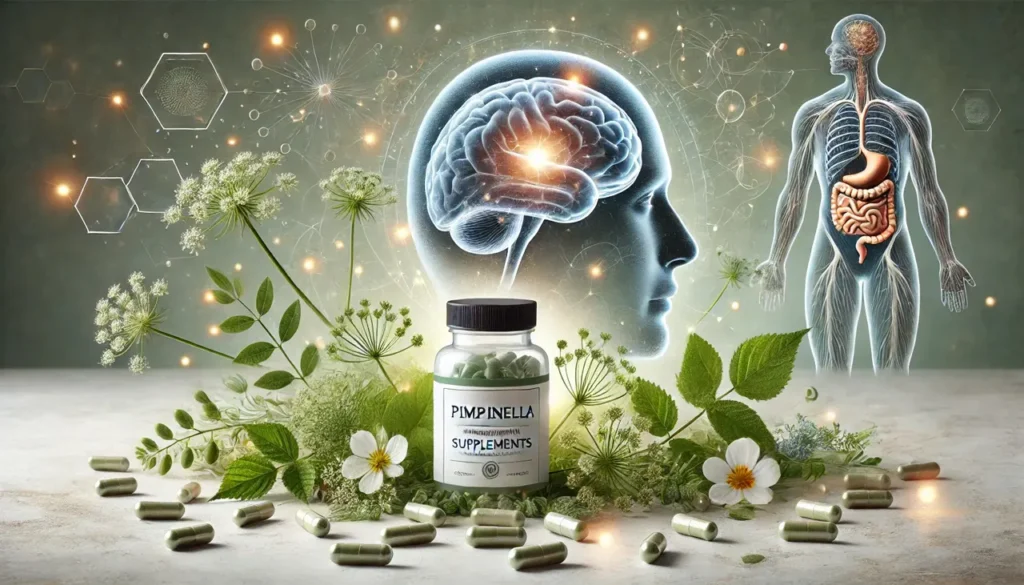The genus Pimpinella comprises several species of flowering plants, with Pimpinella anisum (commonly known as anise) being the most widely recognized for its medicinal uses. This plant is a member of the Apiaceae family and has been used in traditional medicine for centuries to treat digestive, respiratory, and inflammatory ailments. Recently, Pimpinella has gained attention for its potential as a nootropic supplement, known for enhancing cognitive function, focus, and mood stabilization. In this article, we explore the scientific foundation behind Pimpinella‘s potential nootropic benefits, delving into its source, chemistry, physiological mechanisms, safe use, and interactions with other supplements and drugs.
You May Also Like:
Sources of Pimpinella
Pimpinella anisum originates from the Mediterranean and Southwest Asia, where it has long been cultivated for its seeds, which are used as a spice and in medicinal extracts. Anise seeds, essential oils, and powdered supplements are among the most common forms of Pimpinella products available today, each containing varying concentrations of its active ingredients. Pimpinella anisum seeds, for instance, contain 1.5-5% essential oils, depending on the extraction and cultivation methods.
Key sources of Pimpinella include:
- Anise Seeds: These seeds are widely used in culinary applications and contain concentrated active compounds, including anethole, estragole, and anisketone, which are beneficial for various health applications.
- Essential Oils: Anise essential oil, extracted from the seeds, is particularly potent and is commonly used for medicinal and aromatherapeutic purposes. It contains a higher concentration of active constituents than the seeds themselves, making it popular in alternative medicine.
- Dietary Supplements: Powdered anise or encapsulated Pimpinella supplements are becoming more common in the wellness market and are favored for nootropic purposes due to their convenience and standardized dosages.
Although Pimpinella is primarily sourced from seeds, some products utilize the plant’s roots and leaves, which contain additional nutrients and phytochemicals that contribute to its overall nootropic potential.
Promote Digestive Health and Brain Clarity with Pimpinella—Order Today on Amazon!

Chemistry of Pimpinella
The pharmacological effects of Pimpinella are largely attributed to its complex chemical composition, which includes essential oils, flavonoids, coumarins, and phenolic acids. The primary constituents of Pimpinella anisum oil are anethole, estragole, and methyl chavicol, with anethole comprising 80-90% of the oil’s composition. Anethole, a phenylpropanoid compound, is responsible for the characteristic licorice-like flavor of anise and has been shown to possess several bioactive properties, including neuroprotective, anti-inflammatory, and antioxidant effects.
Other active compounds contributing to Pimpinella‘s effects include:
- Estragole: A minor constituent with antimicrobial and cognitive-stimulating properties, estragole complements the neuroprotective role of anethole.
- Coumarins and Flavonoids: These compounds, such as scopoletin and quercetin, provide antioxidant and anti-inflammatory benefits, crucial for reducing oxidative stress in the brain.
- Phenolic Acids: Known for their antioxidant properties, phenolic acids in Pimpinella are essential in protecting brain cells from damage caused by free radicals.
Together, these components contribute to the plant’s neuroprotective and cognitive-enhancing properties. Anethole, the most potent of these compounds, is especially notable for its capacity to modulate neurotransmitter activity in the brain.

Physiological Mechanisms of Pimpinella in the Body and Brain
Pimpinella exhibits various physiological effects that support its use as a nootropic. Its primary mechanism of action involves the modulation of the central nervous system, specifically through interactions with neurotransmitters that influence cognition, mood, and neuroprotection.
- Neurotransmitter Modulation: Anethole in Pimpinella has been found to interact with gamma-aminobutyric acid (GABA) receptors, a neurotransmitter that plays a key role in inhibiting neuronal excitability. By binding to GABA receptors, anethole may promote relaxation and reduce anxiety, making Pimpinella beneficial for stress-induced cognitive impairment.
- Antioxidant Activity: The high antioxidant content in Pimpinella, particularly due to its phenolic acids and flavonoids, helps reduce oxidative stress. Oxidative stress is a significant contributor to neurodegenerative diseases, such as Alzheimer’s and Parkinson’s. By neutralizing free radicals, Pimpinella may provide long-term protective effects on brain cells, supporting cognitive longevity.
- Anti-inflammatory Effects: Chronic inflammation is linked to cognitive decline and mood disorders. The anti-inflammatory properties of anethole and other Pimpinella compounds are mediated by the inhibition of pro-inflammatory cytokines. This process helps reduce brain inflammation and promote a healthier neurological environment for optimal cognitive performance.
- Neuroprotective Properties: Some studies suggest that anethole may protect neurons from damage by modulating apoptotic pathways. Apoptosis, or programmed cell death, is a natural cellular process but can be detrimental when excessively activated in brain cells. By regulating apoptosis, Pimpinella supports the longevity of neuronal cells, which is beneficial for memory retention and learning capacity.
- Mood Stabilization: Pimpinella is also known for its potential for mood enhancement due to its effects on serotonin and dopamine levels. Studies have shown that flavonoids in Pimpinella might help regulate the synthesis and release of these neurotransmitters, aiding in mood stabilization and potentially alleviating symptoms of depression and anxiety.
Support Digestive Ease and Cognitive Health with Pimpinella—Order Now from Amazon!

Potential Nootropic Benefits of Pimpinella
The following nootropic benefits of Pimpinella are supported by its unique chemical composition and physiological mechanisms:
- Enhanced Cognitive Function and Memory: By supporting neurotransmitter function and reducing oxidative stress, Pimpinella may improve memory, focus, and overall cognitive clarity. Regular supplementation could be beneficial for individuals experiencing age-related cognitive decline or those seeking mental performance enhancement.
- Anxiety and Stress Relief: Through its GABAergic properties, Pimpinella may help reduce symptoms of anxiety, which could otherwise impede focus and cognitive efficiency. By calming the mind, it may aid concentration and facilitate learning.
- Antioxidant Protection for Brain Health: The antioxidants in Pimpinella protect neurons from damage due to oxidative stress, a key factor in cognitive aging. This neuroprotective effect could make Pimpinella valuable for long-term brain health.
- Mood Improvement: By positively influencing serotonin and dopamine levels, Pimpinella has the potential to act as a mild mood stabilizer. This effect may be particularly useful for individuals with mood disorders that impact cognitive performance.
- Enhanced Mental Clarity in Stressful Situations: With its combined antioxidant, anti-inflammatory, and anxiolytic properties, Pimpinella may enhance mental clarity in high-stress scenarios by preventing cognitive impairment due to stress.

Dosage and Supplementation Guidelines
While traditional uses of Pimpinella involve both seed and oil forms, supplementation for nootropic benefits requires precise dosing to ensure safety and efficacy. As with any supplement, it’s essential to consult a healthcare provider to determine the optimal dosage based on individual health factors.
- General Dosage for Cognitive Support: For most users, a daily dose of 500 mg to 1,000 mg of powdered Pimpinella seed extract is considered safe and effective. This dosage is believed to offer cognitive and mood-enhancing effects without exceeding safety limits.
- High-Potency Anethole Extracts: When using high-potency anethole or essential oil extracts, lower doses—ranging from 50 to 200 mg per day—may be more appropriate. Essential oil extracts should be diluted and used with caution due to their high concentration.
- Capsule and Tablet Supplements: Capsules and tablets are available in standardized dosages and typically contain between 500 mg and 1,000 mg of Pimpinella extract per serving. Starting with the lowest dose and gradually increasing as needed is advisable for new users.
- Combining with Other Nootropics: Pimpinella may be safely combined with other nootropic agents such as L-theanine or Rhodiola rosea for a synergistic effect. However, users should be cautious when combining it with GABAergic supplements, as this may lead to excessive sedation.
- Special Populations: Pregnant and breastfeeding women should avoid high doses of Pimpinella due to the potential effects on hormone-sensitive pathways. Individuals with chronic health conditions should seek medical advice before using Pimpinella.
Promote Digestive Comfort and Cognitive Clarity with Pimpinella—Buy Today on Amazon!

Side Effects and Safety
While Pimpinella is generally well-tolerated, high doses or long-term use may lead to adverse effects, particularly when using essential oils.
- Gastrointestinal Upset: Common side effects include nausea, vomiting, and abdominal discomfort, particularly when using high-potency extracts. Reducing the dose or taking Pimpinella with food could mitigate these effects.
- Sedative Effects: Due to its influence on GABAergic receptors, Pimpinella may cause drowsiness in sensitive individuals. Users should avoid operating heavy machinery if they experience sedation after taking this supplement.
- Allergic Reactions: Some individuals may have allergic reactions to Pimpinella, with symptoms such as skin rashes, itching, or respiratory issues. Those with known allergies to anise or related plants should avoid this supplement.
- Hormone Sensitivity: Anethole, a component of Pimpinella, has mild estrogenic effects, which may pose a risk to individuals with hormone-sensitive conditions, such as breast cancer or endometriosis.
- Drug Interactions: Pimpinella may interact with medications metabolized by the liver, including some antidepressants and anti-anxiety drugs. Consulting a healthcare provider before use is essential, especially if taking prescription medication.
Interactions with Other Supplements and Drugs
The effects of Pimpinella may be amplified or altered when combined with other supplements or drugs, particularly those affecting the central nervous system.
- Central Nervous System (CNS) Depressants: Combining Pimpinella with other CNS depressants, such as benzodiazepines or certain sedative herbs, may enhance the sedative effect, leading to excessive drowsiness or lethargy.
- Hormone-sensitive Drugs: Due to its mild estrogenic activity, Pimpinella may interfere with hormone therapies. Individuals on hormone replacement therapy or birth control pills should seek medical advice before supplementation.
- Blood-thinning Medications: Pimpinella may have mild anticoagulant effects, which could enhance the effect of blood-thinning medications like warfarin. Monitoring by a healthcare professional is recommended for those taking anticoagulants.
- Liver Metabolism Pathways: Pimpinella is metabolized in the liver, potentially interacting with drugs processed by the cytochrome P450 enzyme system. This could affect the efficacy or safety of medications metabolized through the same pathways.
Support Digestive Wellness and Brain Health with Pimpinella—Order Now on Amazon!

Pimpinella for Cognitive Support and Mood Enhancement
Pimpinella, particularly Pimpinella anisum, offers promising nootropic benefits attributed to its ability to enhance cognitive function, relieve anxiety, protect neurons, and improve mood stability. Its primary active component, anethole, is responsible for many of these effects, working through neurotransmitter modulation, antioxidant activity, and anti-inflammatory pathways. While generally safe in recommended dosages, Pimpinella may cause adverse effects in high doses or when combined with certain medications. As interest in natural cognitive enhancers grows, Pimpinella stands out as a valuable addition for those seeking holistic support for mental clarity, memory, and mood regulation.

References:
- Anise: Uses, Side Effects, & More. Retrieved from: https://www.verywellhealth.com/the-benefits-of-anise-88608
- Review of Pharmacological Properties and Chemical Constituents of Pimpinella anisum. Retrieved from: https://pmc.ncbi.nlm.nih.gov/articles/PMC3405664/
- Investigation of antioxidant, antibacterial, antiviral, chemical composition, and traditional medicinal properties of the extracts and essential oils of the Pimpinella species from a broad perspective: a review. Retrieved from: https://www.tandfonline.com/doi/abs/10.1080/10412905.2021.1928559
- Chapter 20 – Aniseeds (Pimpinella anisum L.) in Health and Disease. Retrieved from: https://www.sciencedirect.com/science/article/abs/pii/B9780123756886100209
Important Note: The information contained in this article is for general informational purposes only, and should not be construed as health or medical advice, nor is it intended to diagnose, prevent, treat, or cure any disease or health condition. Before embarking on any diet, fitness regimen, or program of nutritional supplementation, it is advisable to consult your healthcare professional in order to determine its safety and probable efficacy in terms of your individual state of health.
Regarding Nutritional Supplements Or Other Non-Prescription Health Products: If any nutritional supplements or other non-prescription health products are mentioned in the foregoing article, any claims or statements made about them have not been evaluated by the U.S. Food and Drug Administration, and such nutritional supplements or other health products are not intended to diagnose, treat, cure, or prevent any disease.


